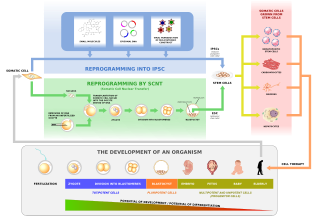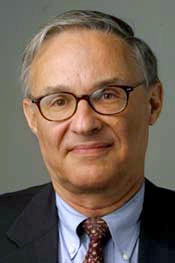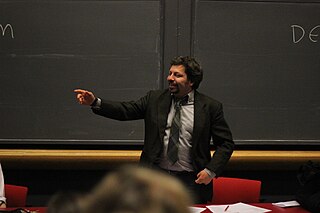Related Research Articles

Human cloning is the creation of a genetically identical copy of a human. The term is generally used to refer to artificial human cloning, which is the reproduction of human cells and tissue. It does not refer to the natural conception and delivery of identical twins. The possibilities of human cloning have raised controversies. These ethical concerns have prompted several nations to pass laws regarding human cloning.
Medical ethics is an applied branch of ethics which analyzes the practice of clinical medicine and related scientific research. Medical ethics is based on a set of values that professionals can refer to in the case of any confusion or conflict. These values include the respect for autonomy, non-maleficence, beneficence, and justice. Such tenets may allow doctors, care providers, and families to create a treatment plan and work towards the same common goal. It is important to note that these four values are not ranked in order of importance or relevance and that they all encompass values pertaining to medical ethics. However, a conflict may arise leading to the need for hierarchy in an ethical system, such that some moral elements overrule others with the purpose of applying the best moral judgement to a difficult medical situation. Medical ethics is particularly relevant in decisions regarding involuntary treatment and involuntary commitment.

Arthur L. Caplan is an American ethicist and professor of bioethics at New York University Grossman School of Medicine.

Leon Richard Kass is an American physician, scientist, educator, and public intellectual. Kass is best known as a proponent of liberal arts education via the "Great Books," as a critic of human cloning, life extension, euthanasia and embryo research, and for his tenure as chairman of the President's Council on Bioethics from 2001 to 2005. Although Kass is often referred to as a bioethicist, he eschews the term and refers to himself as "an old-fashioned humanist. A humanist is concerned broadly with all aspects of human life, not just the ethical."
Human embryonic kidney 293 cells, also often referred to as HEK 293, HEK-293, 293 cells, or less precisely as HEK cells, are a specific immortalised cell line derived from a spontaneously miscarried or aborted fetus or human embryonic kidney cells grown in tissue culture taken from a female fetus in 1973.
The stem cell controversy is the consideration of the ethics of research involving the development and use of human embryos. Most commonly, this controversy focuses on embryonic stem cells. Not all stem cell research involves human embryos. For example, adult stem cells, amniotic stem cells, and induced pluripotent stem cells do not involve creating, using, or destroying human embryos, and thus are minimally, if at all, controversial. Many less controversial sources of acquiring stem cells include using cells from the umbilical cord, breast milk, and bone marrow, which are not pluripotent.
The Johns Hopkins Berman Institute of Bioethics in Baltimore, Maryland, United States, is an interdisciplinary center serving the entire Johns Hopkins University and Health System. It is dedicated to the study of complex moral and policy issues in biomedical science, health care, and health policy. Established in 1995, the Institute seeks answers to ethical questions by promoting research in bioethics and encouraging moral reflection among a broad range of scholars, professionals, students, and citizens. Contributing to its mission are four divisions of the University: the Zanvyl Krieger School of Arts and Sciences, the Johns Hopkins School of Medicine, the Bloomberg School of Public Health, and the Johns Hopkins School of Nursing. Johns Hopkins was the nation's very first research university
In bioethics, the ethics of cloning concerns the ethical positions on the practice and possibilities of cloning, especially of humans. While many of these views are religious in origin, some of the questions raised are faced by secular perspectives as well. Perspectives on human cloning are theoretical, as human therapeutic and reproductive cloning are not commercially used; animals are currently cloned in laboratories and in livestock production.
The National Catholic Bioethics Center (NCBC) is a not-for-profit research center located in Philadelphia, Pennsylvania, after previous locations in St. Louis (1972–1985) and Boston (1985–2004). Its mission is "to uphold the dignity of the human person in health care and biomedical research, thereby sharing in the ministry of Jesus Christ and his Church." The chairman of the Board of Directors is Gregory M. Aymond, Archbishop of New Orleans. The Center publishes Ethics & Medics monthly and The National Catholic Bioethics Quarterly, as well as books including the Handbook on Critical Life Issues.
Jonathan D. Moreno is an American philosopher and historian who specializes in the intersection of bioethics, culture, science, and national security, and has published seminal works on the history, sociology and politics of biology and medicine. He is an elected member of the National Academy of Medicine.
Paul Rodney McHugh is an American psychiatrist, researcher, and educator. He is currently the University Distinguished Service Professor of Psychiatry at the Johns Hopkins University School of Medicine and the author, co-author, or editor of seven books in his field.
The laws and policies regarding stem cell research in the People's Republic of China are relatively relaxed in comparison to that of other nations. The reason for this is due to different traditional and cultural views in relation to that of the West.
A biological patent is a patent on an invention in the field of biology that by law allows the patent holder to exclude others from making, using, selling, or importing the protected invention for a limited period of time. The scope and reach of biological patents vary among jurisdictions, and may include biological technology and products, genetically modified organisms and genetic material. The applicability of patents to substances and processes wholly or partially natural in origin is a subject of debate.

Nicanor Robles Austriaco, Jr. OP is a Filipino-American molecular biologist and Catholic priest. He is a professor of biology and professor of theology at Providence College, in Providence, Rhode Island, and a research fellow at the Center for Theology, Religious Studies, and Ethics, at the University of Santo Tomas in the Philippines.

Françoise Elvina BaylisFISC is a Canadian bioethicist whose work is at the intersection of applied ethics, health policy, and practice. The focus of her research is on issues of women's health and assisted reproductive technologies, but her research and publication record also extend to such topics as research involving humans, gene editing, novel genetic technologies, public health, the role of bioethics consultants, and neuroethics. Baylis' interest in the impact of bioethics on health and public policy as well as her commitment to citizen engagement]and participatory democracy sees her engage with print, radio, television, and other online publications.

S. Matthew Liao is an American philosopher specializing in bioethics and normative ethics. He is internationally known for his work on topics including children’s rights and human rights, novel reproductive technologies, neuroethics, and the ethics of artificial intelligence. Liao currently holds the Arthur Zitrin Chair of Bioethics, and is the Director of the Center for Bioethics and Affiliated Professor in the Department of Philosophy at New York University. He has previously held appointments at Oxford, Johns Hopkins, Georgetown, and Princeton.
The use of fetal tissue in vaccine development is the practice of researching, developing, and producing vaccines through growing viruses in cultured (laboratory-grown) cells that were originally derived from human fetal tissue. Since the cell strains in use originate from abortions, there has been opposition to the practice and the resulting vaccines on religious and moral grounds.

This article is about the Nir Eyal (bioethicist). For the author, see Nir Eyal.

The Janssen COVID‑19 vaccine, sold under the brand name Jcovden, is a COVID‑19 vaccine that was developed by Janssen Vaccines in Leiden, Netherlands, and its Belgian parent company Janssen Pharmaceuticals, a subsidiary of American company Johnson & Johnson.

Vardit Ravitsky is a bioethicist, researcher, and author. She is president and CEO of The Hastings Center, a full professor at the University of Montreal, and a senior lecturer on Global Health and Social Medicine at Harvard Medical School. She is immediate-past president and current vice-president of the International Association of Bioethics, and the director of Ethics and Health at the Center for Research on Ethics. She is a Fellow of the Pierre Elliott Trudeau Foundation, where she chaired the COVID-19 Impact Committee. She is also Fellow of The Hastings Center and of the Canadian Academy of Health Sciences.
References
- ↑ The National Catholic Bioethics Center
- ↑ "Ks. dr Tadeusz Pacholczyk: Komórki zarodka nie są "tylko" zbitką komórek, ale żywą kwintesencją człowieczeństwa…". www.polishclub.org. Archived from the original on 2014-04-13.
- ↑ "Andrzej Pacholczyk", Wikipedia, wolna encyklopedia (in Polish), 2023-01-24, retrieved 2024-01-16
- ↑ Pacholczyk, Tadeusz; Blakely, Randy D.; Amara, Susan G. (1991-03-28). "Expression cloning of a cocaine-and antidepressant-sensitive human noradrenaline transporter". Nature. 350 (6316): 350–354. Bibcode:1991Natur.350..350P. doi:10.1038/350350a0. ISSN 1476-4687. PMID 2008212.
- ↑ Gelernter, Joel; Kruger, Susan; Pakstis, Andrew J.; Pacholczyk, Tadeusz; Sparkes, Robert S.; Kidd, Kenneth K.; Amara, Susan (1993-12-01). "Assignment of the Norepinephrine Transporter Protein (NET1) Locus to Chromosome 16". Genomics. 18 (3): 690–692. doi:10.1016/s0888-7543(05)80375-1. PMID 7905857 . Retrieved 2024-01-16.
- ↑ Amara, Susan G.; Pacholczyk, Tadeusz (1991-06-01). "Sodium-dependent neurotransmitter reuptake systems". Current Opinion in Neurobiology. 1 (1): 84–90. doi:10.1016/0959-4388(91)90014-X. ISSN 0959-4388. PMID 1688010.
- 1 2 Pacholczyk, Tadeusz; Sweadner, Kathleen J. (1997-04-15). "Epitope and mimotope for an antibody to the Na, K-ATPase". Protein Science. 6 (7): 1537–1548. doi:10.1002/pro.5560060718. ISSN 0961-8368. PMC 2143741 . PMID 9232655.
- ↑ "Boston.com / News / Science / The human face of stem cell research". archive.boston.com. Retrieved 2020-12-23.
- ↑ "Videos | Search | C-SPAN.org". www.c-span.org. Retrieved 2020-12-23.
- 1 2 Wadman, Meredith (2020-07-31). "Antiabortion ethicists and scientists dominate Trump's fetal tissue review board". Science. doi:10.1126/science.abe1214. ISSN 0036-8075. S2CID 225460995.
- ↑ Pacholczyk, Tadeusz (November 2020). "Making Sense of Bioethics: Must Catholics Refuse a COVID-19 Vaccine Made With a Cell Line from an Abortion?" (PDF). FatherTad.com. Retrieved 22 December 2020.
- 1 2 3 "Making Sense of Bioethics: 185 : Must Catholics Refuse a COVID-19 Vaccine Made with a Cell Line from an Abortion?". The National Catholic Bioethics Center. 30 November 2020. Retrieved 2020-12-23.
- 1 2 3 4 5 6 7 "Making Sense of Bioethics" Column". The National Catholic Bioethics Center. Retrieved 2020-12-23.
- ↑ "Making Sense of Bioethics: Column 159: Opioids, Pain Management, and Addiction - Balancing Ethical". The National Catholic Bioethics Center. 30 September 2018. Retrieved 2020-12-23.
- ↑ "Making Sense of Bioethics: Column 143: Doping Athletes". The National Catholic Bioethics Center. 30 May 2017. Retrieved 2020-12-23.
- ↑ "NCBC Videos by Father Tad - YouTube". www.youtube.com. Retrieved 2024-01-16.
- ↑ "NCBC Talks by Father Tad". Vimeo. Retrieved 2024-01-16.
- ↑ "NIH Human Fetal Tissue Research Ethics Advisory Board - FY2020 - Members" (PDF). National Institutes of Health Office of Science Policy. 2020-07-31. Retrieved 2024-01-16.
- ↑ Interview with Father Tadeusz Pacholczyk, Ph.D.
- ↑ Tadeusz Pacholczyk (2012-10-07). "Please Step Back From the Assisted-Suicide Ledge". WSJ.com. The Wall Street Journal.
- ↑ "Sexual Orientation: Hope for restoration and healing with SOCE". Catholic Herald. 22 October 2018.
- ↑ The Louisiana Weekly, October 4, 2010
- ↑ "The Foxes and the Henhouse". The Boston Pilot. Archdiocese of Boston. Retrieved 29 January 2020.
- 1 2 Hadro, Matt. "Should prisoners be first, or last in line for COVID vaccine?". Catholic News Agency. Retrieved 2020-12-23.
- 1 2 "Bioethics questions emerge from experimental drug used in COVID-19 treatment". National Catholic Reporter. 2020-10-12. Retrieved 2020-12-23.
- 1 2 "Making Sense of Bioethics: Column 183: Is Mandating a COVID-19 Vaccine Ethical?". The National Catholic Bioethics Center. 30 September 2020. Retrieved 2020-12-23.
- 1 2 "Making Sense of Bioethics: Column 177: Thinking Through the Rationing of Ventilators". The National Catholic Bioethics Center. 30 March 2020. Retrieved 2020-12-23.